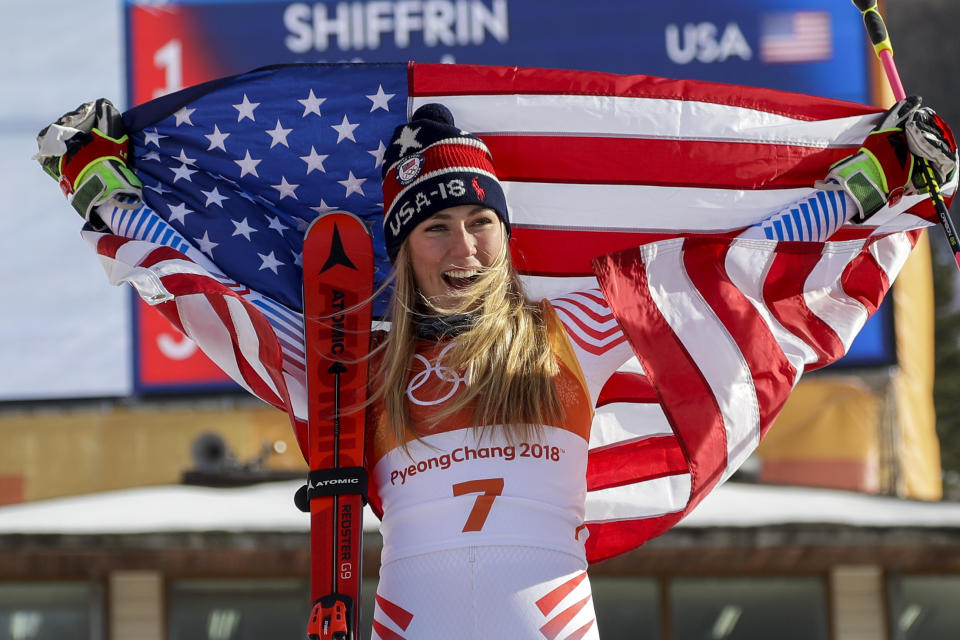Shiffrin answers her mom's prayers with second Olympic gold medal
PYEONGCHANG, South Korea – The moment her daughter burst through the start gate at the top of the giant slalom course at Yongpyong Alpine Centre, Eileen Shiffrin’s lips started to move. Everything else on her body was still. Her fingers were interlocked, pushed up against her forehead, elbows splayed to the side. Her red ski boots dug into the snow. Her eyes, behind dark-tinted sunglasses, fixed on the giant screen that showed her daughter, Mikaela, weaving through 49 turns. Just her lips fluttered, almost imperceptibly, so subtle it was impossible to perceive the words.
“I was saying, ‘Hail Mary, full of grace. The Lord is with thee,’” Eileen said in the aftermath of Shiffrin’s rousing Olympic gold-medal run, the second of her career and first in the GS. Eileen is Shiffrin’s mom, her confidant and her coach, an amalgamation that turns every race into a time for prayer.
And while she wasn’t supplicating for her daughter to win – “I’m just praying that she’s OK,” Eileen said, “or that she doesn’t get hurt, or that she can ski well so she’s happy because she’s worked really hard to do this” – the results nevertheless edified her. Mikaela Shiffrin, the greatest female ski racer in the world, came to the PyeongChang Games to do historic things. And following three days of wind-related delays, she slayed a race that has vexed her for years.
How Shiffrin beat the GS, and the talented field that also endeavored Thursday to conquer it, speaks to her ascent toward the top of all-time lists as a 22-year-old. Her dominance in slalom is Brobdingnagian, and anything but gold Friday (Thursday night in the U.S.) would be a disappointment. Her focus on speed events gives her hope in the downhill and combined, which marries slalom and downhill. Four medals are certainly possible. Four golds are not entirely out of question. And even as she scratched the Super-G from her schedule Thursday, owing to the demands of the other races, Shiffrin’s first gold puts her in position to be the standout American athlete of these Winter Olympics.
It was easy to appreciate why she dropped to her knees when she realized she had won. What Shiffrin deemed a “love-hate relationship” with the GS spans years. She loves the race even as it has hated her. To see her during the first run tested Eileen’s will and sent her repeating the same 42 words. “It’s my mantra,” Eileen said. “It’s what I say. People have their things. It’s what I do with my brain when I don’t know what to do and I’m nervous.”
Turns out there was no good reason for nerves. Shiffrin’s turns were tight, her intent obvious, her form true. Only one racer finished the first run ahead of her 1:10.82. In between runs, Shiffrin napped for about an hour, did some freeskiing on the men’s course adjacent to the women’s and kept an eye on her rivals, who knew with Shiffrin racing second to last they needed to make up significant time.
“I was watching all these girls go down on the second run and attacking,” Shiffrin said. “Everybody wants gold. Everybody’s skiing to win. It kind of left me no choice but to do the same thing.”

A committed and adrenalized Shiffrin is a sight to behold. In past GS races, she said, she would head into the second run with a podium finish in sight and ease up, protective, fearful. She felt no such compunction Thursday.
“The Olympics,” Shiffrin said, “is not about protecting the lead. It’s about putting your best on the line. You see what happens. … I was feeling the hill. I was feeling the mountain and feeling my skis. I was really letting it go as much as I could in that second run.”
So much so that in the race’s final interval, Shiffrin took an aggressive turn and lost her balance. She recovered, crossed the finish line in 1:09.20 and won when first-run leader Manuela Moelgg turned in the 23rd-best second run. Shiffrin’s was fourth, and the run-to-run consistency she sought for years finally had arrived with a 0.39-second win over silver medalist Ragnhild Mowinckel and 0.46 seconds ahead of Federica Brignone, who took bronze.
She earned it. Shiffrin’s evolution from slalom specialist to the sort of racer who can win downhill events is rare and conveys her talent. Most racers succeed in disciplines that require tremendous technique, like slalom, or ones that reward pure speed, like downhill. The more Shiffrin focused on the speed events, the more her GS – which has wider gates than slalom – improved.
“She found a whole new level and has been honing that in,” said Taylor Shiffrin, her brother. “Plus she’s had a lot of time between the last World Cup races and now. She got here early. Got used to everything. Worked out any kinks. Knew how everything operated.”
And so when she and Eileen were talking before the second race, Shiffrin heard the words she wanted to hear, the words she knew were true: “You can do this,” Eileen said, “so don’t back off.”
She did it, all right, winning the United States’ fifth gold medal of the PyeongChang Games, adding another to her collection after taking slalom in Sochi, showing the hype leading up to this day was warranted and giving particular significance to that 42nd and final word her mom kept repeating.
Amen.
More Olympic coverage from Yahoo Sports:
• Adelson: U.S. women lose to Canada, still can’t figure out hockey rival
• Shiffrin will not race super-G, ending quest for five gold medals
• Wetzel: Rippon ‘living his best life,’ has no time for haters
• Photos: Olympic athlete couples competing in PyeongChang
• Passan: Shiffrin starts Olympics with gold medal in giant slalom


